Ghost Trapper 14 Midnight Movie Read online
Page 5
“I don’t think the last person to live in this room moved out,” I said. “It seems like they might have died here.”
“Well, thanks for that eerie comment.” Stacey took snapshots and electrical readings.
A row of framed family pictures stood atop a boxy white and black dresser with door pulls that looked like golden camels. I studied a wedding picture—the man was tall, his face pitted with little scars that were visible despite attempts at makeup. His smile was barely visible under his huge, swooping mustache. His gaze was strong; he wasn’t particularly tall or large but exuded some intense energy. His wedding attire was a canary yellow fedora and suit, not the most traditional formalwear for a Southern wedding.
His bride’s dress was an ivory lace column gown with golden Grecian designs and a high empire waist. Her elbow-length gloves were a sparkling gold, as were the feathers on her wide-brimmed hat. They certainly struck me as people who might have redecorated this simple, boxy farmhouse into what we saw around us. Clearly, the house’s original structure was much older, dating to sometime in the 1800s.
In another picture, the former bride, now a few years older and in a midi dress with thick, colorful stripes, knelt with her arms around two elementary age children, a girl and a boy in their Sunday best. In this case, that was a teal suit with a cravat for the grumpy-looking boy and a colorful, copiously poofballed dress and big glittering bows for the girl.
The husband stood stiffly off to one side, sticking with his 1950s-style fedora and suit instead of embracing quirky 60s fashion like his wife. This picture’s fedora-suit combo was gray plaid instead of canary yellow. He still sported the giant mustache that covered much of his face.
The oldest photograph that I found showed a stern-looking older man and woman of an earlier generation, dressed in much more conservative church wear, the woman in a long dress and pearls, leaning on a cane, though she wasn’t elderly in the picture.
A woman’s clothes hung in the closet. Poking around, I found a couple of bright dancing dresses far in the back, but most of that wardrobe had given way to more practical items over the years, looser things made of flannel with more flexible waistbands, and more comfortable shoes without narrow spikes for heels. I got the sense that the party-girl bride had grown old here in this house, in this room, among these echoes of her earlier life. But where were the possessions of her overly mustached husband?
“Hey, look at this weird door.” Stacey drew back immense window curtains that looked like they’d been purloined from an actual theater, thick and crimson red with miles of golden fringe, so long they puddled on the rotten carpet. Stacey grimaced as she knotted the slimy golden ropes of the curtain ties, then wiped her hands on her jeans.
There had once been a dormer window here, looking out over the front porch, but it had been replaced by a narrow glass door. The glass was shattered, the door ajar, the thick shag carpet all around it blackened from years of rain and decay.
Carpet squished under my boots as I stepped over. I eased open the door and slipped out onto the sloped roof, emerging in the area marked off by the railing. Loose shingles slipped under my feet. If I lost my balance, I could easily crash through the crooked railing and land in the front yard, on the weedy ground if I was lucky, the brick walkway if I wasn’t.
The remnants of the bench where Stan Preston had watched movies from home slumped next to the speaker pole.
“This thing’s long dead, obviously.” Stacey gently lifted the speaker from its latch. A cable trailed from the back of the speaker and down inside the pole. “You’d hang this on your car window. Normally, I mean. They probably didn’t park their car on the roof. This was just the type of speaker they had handy.”
“This isn’t a bad vantage for our cameras. A little overgrown.” I could see over the fence and across the lawn to the buildings and parking lot, a pretty solid manager’s-eye view of the drive-in, partly obscured by tree branches around the house.
“The movie on the big screen could blind the night vision camera.”
“Set up a conventional camera, too. Put them both on timers so they click over to night vision at midnight, after the movie ends.” I looked at the rust-splotched speaker, which Stacey had replaced on the pole. “Maybe a microphone, too. Just for fun.”
“Aye aye, sarge.” Stacey got to work, setting up tripods and battery packs inside the broken glass door of the dormer, so they’d be somewhat protected against the weather.
I nosed around the upper floor. There were three additional bedrooms, none particularly large.
Two were stripped down, lacking much furniture or decoration beyond the tiger-striped walls in one and jazzy geometric wallpaper in the other. I found an antique model airplane parked on the upper shelf of the closet in the striped room, and a long-abandoned dollhouse and mildewed stuffed animals in the wallpapered room.
At the back of the house, the largest bedroom was cool and dark even during the day, its windows overgrown with vines that filled it with the smell of earth and vegetation. A trace of cloying, flowery perfume hung in the air, as though it had become ingrained in the woodwork over many years. A strong, unexpected scent could also be an olfactory manifestation of something paranormal—often they were pretty gross, like the smell of decay, so even a sickly-sweet perfume was a better odor than most.
There wasn’t a touch of lacquer, gilt, or bright zigzags in this room. The dresser and nightstand were thick, heavy wood. Everything looked handmade to me, possibly original to the house. This older, plainer furniture had survived the ravages of time and abandonment far better than the floofy stuff in the other bedroom and downstairs.
A dusty, unadorned walking cane reminiscent of a shepherd’s crook hung on the closet doorknob. A number of overlapping small circles, about the size of the round base of the cane, were stamped into the hardwood floor by the bare iron bedframe, near yet another leaking window.
“Done!” Stacey popped into the doorway, beaming. “Ooh, looks like you found the house’s gloom room. Wanna bet somebody died in here, too? Like that first room? How do you like when I say it, Ellie?”
“It’s possible,” I said. “My sense is the kids grew up and moved out. These both look like women’s bedrooms. Who exactly lived here last?”
“I don’t know. All I know is Stanley lived his final years in the screen tower apartment.”
“We’re going to need more location history. Hopefully, his daughter will feel like talking.”
“It’s getting dark. You feel like maybe leaving the creepy old house now?”
“You really don’t like it here, do you?” I looked at some yellowed pictures on the wall, depicting this area as a working farm, with a chicken house and goat pen and rows of crops, those features long gone now. The earlier generation of farm family had no time for fancy hats with golden feathers. The father wore a straw hat and overalls, the mother a starchy-looking calico dress, the children patchwork clothing. The faces of the past had been left here in this abandoned place, to be remembered by the shadows and the wind blowing through cracks and holes in the walls. I wondered how many had lived here over the years, and how many had died.
I snapped pictures with my phone before we left.
Outside, the garden was gloomy as the sun crawled down out of the sky.
Chapter Six
We set up some cameras on the wooden stage Benny and his band had built under the screen. They looked out at the parking lot and the buildings beyond, giving us a reverse angle from the cameras back at the farmhouse. If anyone snuck up on us while we watched tonight’s movie, hopefully we’d catch them coming or going.
By the time our gear was ready and recording, the sun was down. We caught up with Benny in the Purple Pizza Eater concession stand.
“Ready for the show?” Benny stepped up behind the counter. Popcorn burst deliciously in the popcorn machine. “Callie left a few pizzas prepped in the fridge. You guys want me to bake one?”
“That sounds reall
y great, but we probably shouldn’t eat pizza every day, no matter how good it is.”
“Speak for yourself,” Stacey said. “I’m getting some popcorn, too.”
While Stacey waited for the popcorn, I wandered into the game room with its lone game, a foosball table that wasn’t even configured to take money from customers.
“Isn’t that Adaire Fontaine again?” I asked Stacey, pointing at the Pocketful of Aces poster. An alluring woman in a black chiffon gown and wide-brimmed, feather-adorned black hat clung to Chance Chadwick. Chadwick, clad in dark pinstriped suit and fedora, fanned five aces in one hand. The fifth ace had a five-pointed star as its symbol, since the four real suits were already taken.
Stacey glanced at the poster. “Oh, yep.”
“I watched A Soldier’s Dame with Michael last night,” I said.
“Really? That’s awesome. Did it bring out his soft and sensitive side?”
“It brought out his sister’s.”
“Yeah? She’s okay since the whole…” Stacey trailed off, making vague gestures with both hands. We both knew she meant Melissa’s possession by the diabolical spirit Anton Clay.
“I don’t know, but she’s getting along okay. Eager to dive into her future and leave the past behind.”
“That’s probably for the best. We all have our ghosts from the past.” She stretched and looked at the foosball table. “You any good?”
“At foosball? I’ve played it before.”
“That’s not what I asked.”
“I’m probably not that good.”
“I bet I can whip you at it.”
“Well, I concede the point.”
“Oh, you think you can take me? Come on.” Stacey picked up the rubber ball and held it over the little chute. “Loser buys at the concession stand. Ready?”
“Yeah. Fine.” I took control of two rods, and Stacey dropped the ball into play. She started whacking the ball easily past my little characters, expertly shifting hers back and forth until they smacked the ball into my goal, right past my ineffective attempts to block. I managed to make the goalie turn a flip, but not at a useful place or time.
“Boom! Point!” Stacey held up both hands as though calling a touchdown.
“I noticed.” I tried to play a little more seriously, as I grew to understand that my lack of foosball experience would in no way dissuade her from razzing me if she beat me.
“Hey, ghostbusters, I’ll leave the popcorn out for you.” Benny appeared at the door with an iPad in his hand, displaying a security-cam view from the front of the theater. “There’s an actual customer at the ticket booth for some reason, so I’ll zip over there and collect admission.”
“Thanks. We’ll be done here as soon as I totally own Ellie,” Stacey said.
While she spoke, I saw my opportunity and gave the little ball a hard kick with one of my guys, zinging it down the unprotected gullet of Stacey’s goal. My characters flipped around and around with the force of the blow, as if cheering the point they’d scored.
“Hey, no spinning,” Stacey said. “That doesn’t count.”
“You can’t just make up rules mid-game.”
“Everyone knows about the no-spinning rule.”
“I didn’t.”
“You should have.”
Stacey beat me by six points out of ten. Though I would argue it was only five.
By then, Benny was back from the ticket booth, and Stacey added a strawberry jalapeno cola to her order. And popcorn. And a slice of pizza. All on my tab. She was taking me to the cleaners.
“Enjoy the show.” Benny tapped his tablet; he could monitor the ticket booth camera and control the theater projector from it. “Tune your car radio to 89.3 FM. If you forget the channel, just check one of the ten signs that mention it. Here we go… this evening’s cartoon begins in three… two…”
“We’re missing it!” Stacey said.
We hurried outside, laden with snack foods and related beverages. A van holding a family with two parents and four kids had parked in the third row, not far from the sunken brick structure of the primitive projection house of yesteryear. That low, tomb-like building lay dark and lifeless as the movie was projected from the second-floor window of the concession stand far away.
We clambered inside our van on the front row.
“Oh, my gosh! Powerpuff Girls? Good choice.” Stacey settled into her seat, arranging her popcorn and drink.
I tuned the van’s radio, and the evening’s cartoon played over our speakers. Blossom, Bubbles, and Buttercup found themselves in a maze-like jungle temple. The episode seemed like a good set-up for the eventual feature, Labyrinth.
After the cartoon was a clip from a Muppet movie I’d somehow never heard of before, Billy Bunny’s Animal Songs. Words on the screen guided the audience in singing along with a group of musical frogs and Billy Bunny himself as he made his way through a treacherous, puppet-infested swamp.
I wondered if the kids in the van were singing along with the Muppets.
Stacey certainly was.
When that was over, we got a literal song and dance from animated drinks and popcorn boxes reminding us to visit the concession stand. The cartoon probably dated back to the 1950s.
A second cartoon, with more of a 1970s feel, featured a flying-saucer pizza, its pepperoni glowing like red portholes, zapping grumpy cartoon kids with a red pizza ray that placed slices in their hands and turned their frowns upside down.
Something moved in my sideview mirror. The other van opened, and a dad herded four kids to the Purple Pizza Eater. They returned with purple-striped cups, pizza slices, and a giant tub of popcorn.
“Here we go,” Stacey whispered as the feature began.
My memories of Labyrinth were vague and distant, so I quickly got sucked into the tale of the stolen child and his sister who had to seek him out in the goblin realm. Also, David Bowie.
As Sarah, the teenage girl in search of her kidnapped baby brother, descended into the well of hundreds of hands that formed into unsettling faces when they wanted to speak, a bright light flared in my sideview, jarring me out of my popcorn-and-movie-induced trance.
The family van behind us had activated its headlights and started its engine, even though the movie wasn’t over. Maybe the parents had gotten fed up after the puppet sing-along. Or maybe…
Stacey and I hopped out, recognizing the parallel to other situations where theater customers had run off during the feature.
We approached cautiously, leaving the first ring of cars for the second. The van tore out of its parking spot on the third ring, tires squealing and leaving tracks on the pavement.
The front passenger window lowered, and a lady yelled at us in Spanish, gesticulating wildly. Unfortunately, I had no idea what she meant. The four kids screamed inside the van.
The dad laid on the gas and they hauled away, fishtailing down the exit drive for the highway.
“Another satisfied customer,” Stacey said, watching their taillights fade through a haze of tire smoke.
Benny raced out from the purple pizzeria to join us. “What happened? Why’d they leave?”
“We’re not sure.” I stepped into the spot where they’d parked. “Does anybody smell cigar smoke?”
“Kind of hard to tell through the car exhaust and burned rubber.” Stacey waved her hand in front of her face.
“Yeah, true.” I recalled how Benny had described it as the smell of their business failing.
The runaway customers had parked next to the sunken, tomb-like old projector house. I knelt in front of the two hinged metal plates, lifted one, and peered down into the projector porthole. It was like looking into a basement window, or maybe a sewer drain where a killer clown might pop up and offer balloons.
Nothing clawed my face off, or tried to lure me with a free balloon, but the smell of cigar smoke oozed out from down there.
Clicking on my light, I saw the hulking antique fire hazard of the 1955 projector, the shelves full o
f film spools and assorted junk, and that was it. Nobody was in there.
“It must have been a job back in the day,” Benny said. “The carbon arc burned hot, about six thousand degrees. You had to keep it burning and keep the coolant system watered, too, in between constantly swapping out reels. The carbon burned down after twenty minutes. That’s why the reels were twenty minutes long.”
“Are you sure nobody’s been down here recently?” I asked.
“Nobody but me, and only at our first walk-through. It’s a sad spot to me because everything’s rusted or rotten down there. Forgotten stuff. It’s locked, but I have the key if you want to go in.”
“I’ll take it.”
He sighed as he handed over the key, looking down the exit drive where the customers had gone. “This cannot keep happening. Did you catch anything on camera?”
“We’ll be checking that soon,” I said. “In the meantime, just keep the movie rolling. Maybe the apparition will come for us next.”
“I’m having a great time, by the way,” Stacey said. “Great selection of shorts for the lead-up.”
“Oh, thanks!” Benny scratched at his beard. “Yeah, I thought the Muppet sing-along would be a fun group activity. That’s what the drive-in’s all about, the social side of movie watching.”
“Stacey certainly enjoyed it,” I said. “Let’s go back. I want to see how the movie ends.”
We returned to the van in time to see the final showdown, the inept goblins’ wacky attempts at war.
I kept glancing outside. Our windows were open so we’d catch any whiff of cigar smoke. We waited for the entity to come for us next.
Unfortunately, it did not make an encore appearance, at least not by the time the movie ended and the screen went dark.
“Hey, guy, come haunt us!” Stacey shouted into the empty, darkened parking lot. “Are we not worth haunting or what?”
Her shouts, not surprisingly, didn’t help.

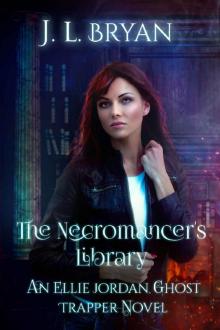 Ghost Trapper 12 The Necromancer's Library
Ghost Trapper 12 The Necromancer's Library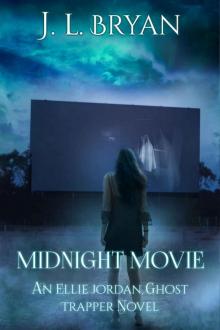 Ghost Trapper 14 Midnight Movie
Ghost Trapper 14 Midnight Movie_preview.jpg) Fairy Metal Thunder (Songs of Magic, Book 1)
Fairy Metal Thunder (Songs of Magic, Book 1)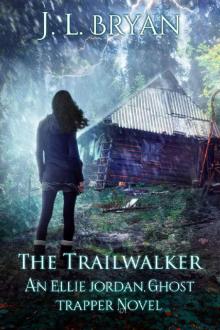 Ghost Trapper 13 The Trailwalker
Ghost Trapper 13 The Trailwalker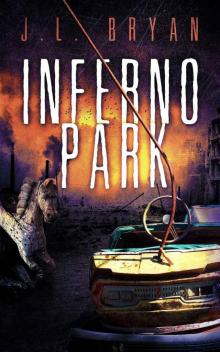 Inferno Park
Inferno Park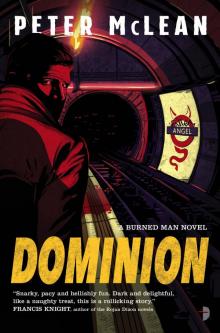 Dominion
Dominion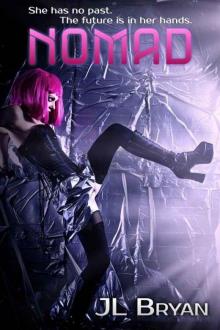 Nomad
Nomad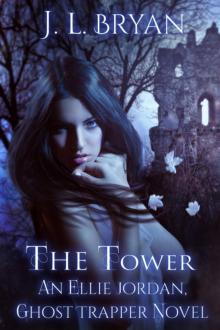 The Tower (Ellie Jordan, Ghost Trapper Book 9)
The Tower (Ellie Jordan, Ghost Trapper Book 9) Jenny Pox (The Paranormals, Book 1)
Jenny Pox (The Paranormals, Book 1)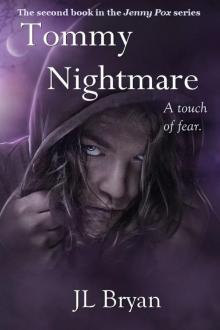 Tommy Nightmare (Jenny Pox #2)
Tommy Nightmare (Jenny Pox #2)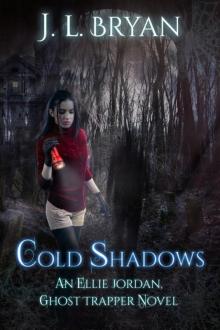 Cold Shadows (Ellie Jordan, Ghost Trapper Book 2)
Cold Shadows (Ellie Jordan, Ghost Trapper Book 2)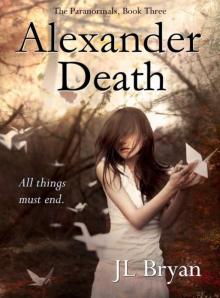 Alexander Death (The Paranormals, Book 3)
Alexander Death (The Paranormals, Book 3)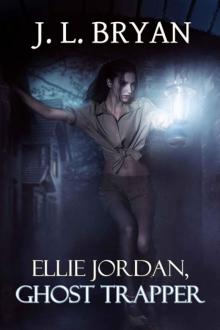 Ellie Jordan, Ghost Trapper
Ellie Jordan, Ghost Trapper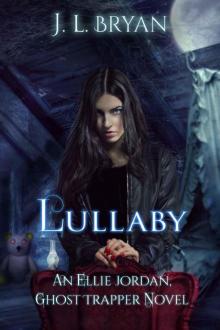 Lullaby (Ellie Jordan, Ghost Trapper Book 7)
Lullaby (Ellie Jordan, Ghost Trapper Book 7)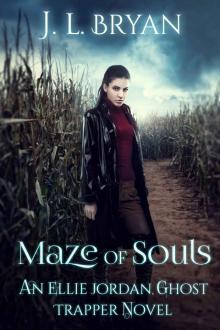 EJ06 - Maze of Souls
EJ06 - Maze of Souls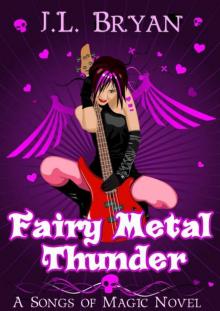 Fairy Metal Thunder (Songs of Magic, #1)
Fairy Metal Thunder (Songs of Magic, #1)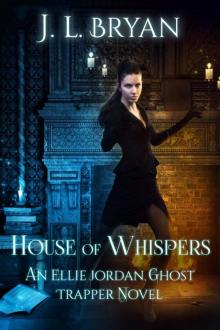 House of Whispers (Ellie Jordan, Ghost Trapper Book 5)
House of Whispers (Ellie Jordan, Ghost Trapper Book 5)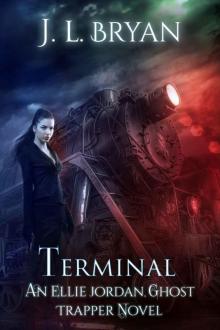 Terminal (Ellie Jordan, Ghost Trapper Book 4)
Terminal (Ellie Jordan, Ghost Trapper Book 4) Jenny Pox
Jenny Pox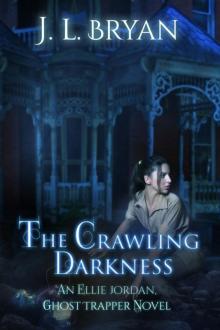 The Crawling Darkness (Ellie Jordan, Ghost Trapper Book 3)
The Crawling Darkness (Ellie Jordan, Ghost Trapper Book 3)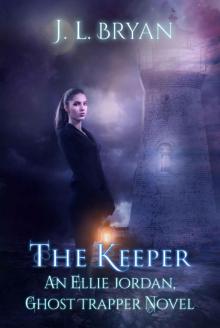 The Keeper (Ellie Jordan, Ghost Trapper Book 8)
The Keeper (Ellie Jordan, Ghost Trapper Book 8)